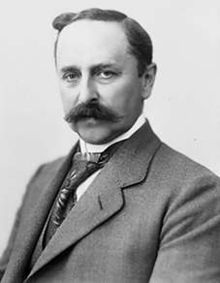Nils Edén
| Nils Edén | |
|---|---|
 |
|
| 15th Prime Minister of Sweden | |
|
In office 19 October 1917 – 10 March 1920 (2 years, 143 days) |
|
| Monarch | Gustaf V |
| Preceded by | Carl Swartz |
| Succeeded by | Hjalmar Branting |
| Personal details | |
| Born |
25 August 1871 Piteå |
| Died | 16 June 1945 (aged 73) |
| Political party | Liberal Coalition Party |
| Alma mater | Uppsala University |
Nils Edén (25 August 1871 – 16 June 1945) was a Swedish historian and liberal politician, Prime Minister of Sweden 1917–1920, and along with Hjalmar Branting acknowledged as co-architect of Sweden's transition from quasi-absolute monarchy to a parliamentary democracy with equal male and female suffrage.
Edén was born in Piteå, in Norrbotten, son of a school principal, and graduated from secondary school in Luleå before matriculating at Uppsala University in 1889. He completed his Ph.D. in 1899 and was made docent in history at the university the same year. He was a specialist in Swedish 16th and 17th century history, but also published on topics concerning the union of Sweden and Norway. His dissertation, Om centralregeringens organisation under den äldre Vasatiden 1523–1594 ("The organization of the central government during the older Vasa period, 1523–1594", 1899), was awarded the Geijer Prize.
Nils Edén became lecturer of history at Uppsala University in 1899, extraordinary professor in 1903 and ordinary professor in 1909. He retained his chair until 1920, when he became governor of Stockholm county. In the meantime he was active as a liberal politician, having written on the burning issue of the union with Norway as early as the 1890s, arguing among Uppsala students for the system of compulsory military service that was introduced with the abolishment of the allotment system in 1901, and for universal suffrage, an issue that were in his mind and in the political rhetoric of the time connected to that of compulsory military service.
...
Wikipedia
